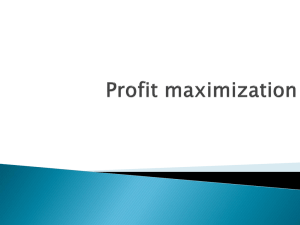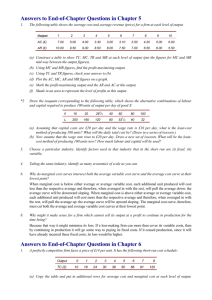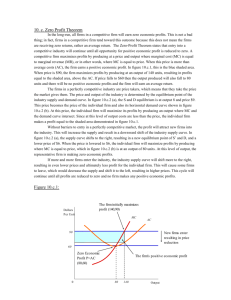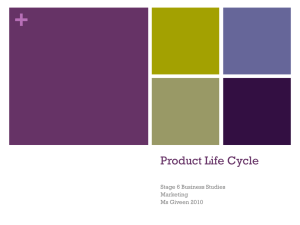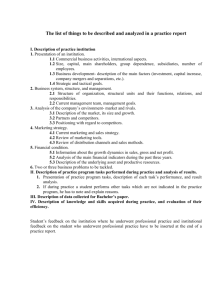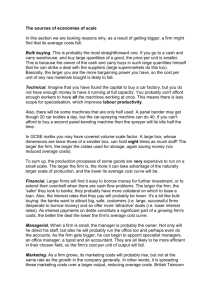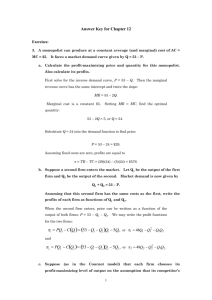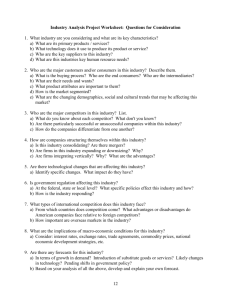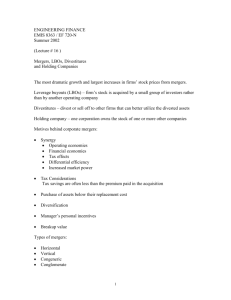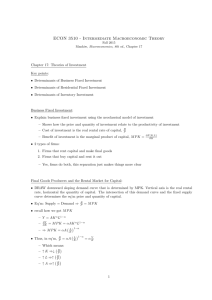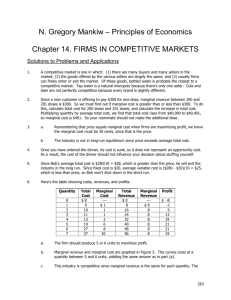Part F: Supply: Alternative Strategies
advertisement
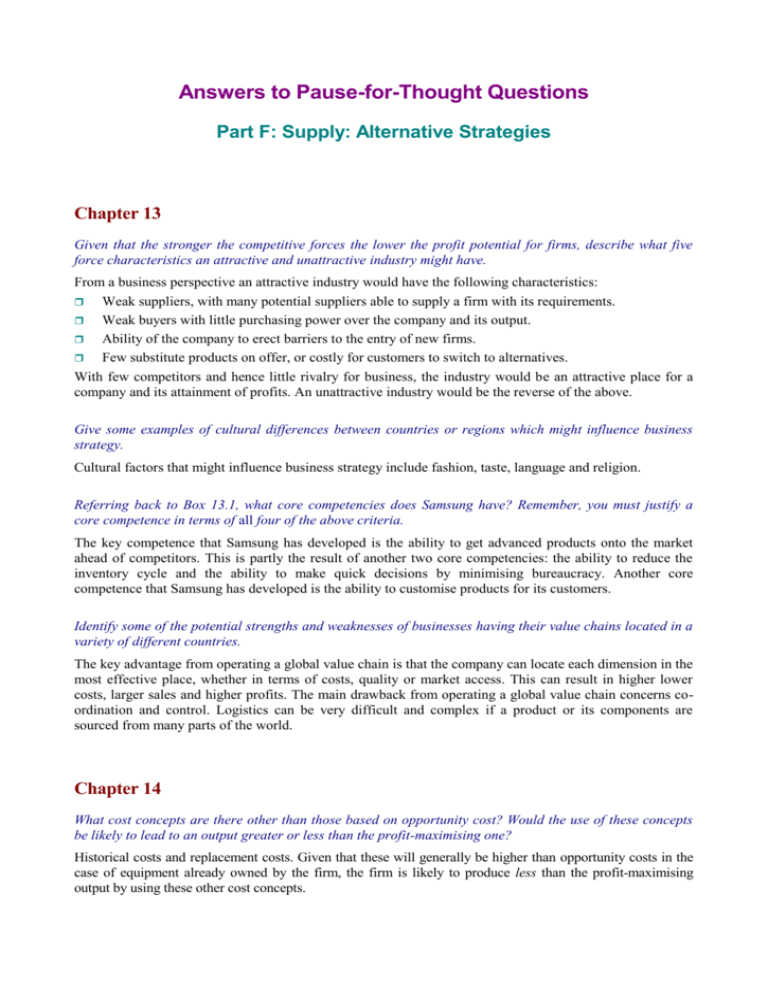
Answers to Pause-for-Thought Questions Part F: Supply: Alternative Strategies Chapter 13 Given that the stronger the competitive forces the lower the profit potential for firms, describe what five force characteristics an attractive and unattractive industry might have. From a business perspective an attractive industry would have the following characteristics: Weak suppliers, with many potential suppliers able to supply a firm with its requirements. Weak buyers with little purchasing power over the company and its output. Ability of the company to erect barriers to the entry of new firms. Few substitute products on offer, or costly for customers to switch to alternatives. With few competitors and hence little rivalry for business, the industry would be an attractive place for a company and its attainment of profits. An unattractive industry would be the reverse of the above. Give some examples of cultural differences between countries or regions which might influence business strategy. Cultural factors that might influence business strategy include fashion, taste, language and religion. Referring back to Box 13.1, what core competencies does Samsung have? Remember, you must justify a core competence in terms of all four of the above criteria. The key competence that Samsung has developed is the ability to get advanced products onto the market ahead of competitors. This is partly the result of another two core competencies: the ability to reduce the inventory cycle and the ability to make quick decisions by minimising bureaucracy. Another core competence that Samsung has developed is the ability to customise products for its customers. Identify some of the potential strengths and weaknesses of businesses having their value chains located in a variety of different countries. The key advantage from operating a global value chain is that the company can locate each dimension in the most effective place, whether in terms of costs, quality or market access. This can result in higher lower costs, larger sales and higher profits. The main drawback from operating a global value chain concerns coordination and control. Logistics can be very difficult and complex if a product or its components are sourced from many parts of the world. Chapter 14 What cost concepts are there other than those based on opportunity cost? Would the use of these concepts be likely to lead to an output greater or less than the profit-maximising one? Historical costs and replacement costs. Given that these will generally be higher than opportunity costs in the case of equipment already owned by the firm, the firm is likely to produce less than the profit-maximising output by using these other cost concepts. Answers to pause-for-thought questions in Economics for Business (3rd edition), John Sloman and Mark Sutcliffe How will competition between growth-maximising firms benefit the consumer? The firms may compete in terms of price or product specification in order to gain a bigger share of the market. Also the ‘competition for corporate control’ (i.e. the potential competition for the control of companies, by, say, rival take-over bids) will encourage firms to be efficient, both to help stave off predators and to help them in their bids to take over other companies. Will this type of behaviour tend to lead to profit maximisation? Only if they are trying to outdo their rivals in terms of profit. Chapter 15 Before you read on, what constraints on its growth do you feel a business might experience? Business growth might be constrained by: financial conditions such as access to money to fund the growth process. whether shareholder attitudes towards growth are favourable, and whether they are prepared to sacrifice some share dividend (profit) for potential long-term profits and a higher share value. the state of demand within the markets in which the business operates. the quality of management and whether the management team is capable of realising improved business growth. See if you can identify two other companies that are vertically integrated. Oil companies, such as ExxonMobil, explore for oil and gas reserves, drill, transport, refine, process, distribute and sell to customers. Many companies in the coffee industry own plantations, coffee processing plants and distribution networks. Kraft, for example, buys, roasts and markets its coffee. Which of the three types of merger (horizontal, vertical and conglomerate) are most likely to lead to (a) reductions in average costs; (b) increased market power? (a) Horizontal: there is probably greater scope for rationalisation of production in fewer plants or for each plant to concentrate on a smaller range of products. Note that there is some scope for this with vertical mergers too (and possibly, to a limited extent, with conglomerate mergers). (b) Horizontal: this directly reduces the number of producers of the particular product(s). What are the difficulties associated with acquisitions and mergers? A difficulty with acquisitions and mergers is that the business acquires the liabilities as well as the assets of the business. It thus incurs enhanced risk. Strategic alliances, by contrast, help spread such risk. Mergers and acquisitions are also more likely to attract the attention of the competition authorities, which may slow down the process or even prevent the merger or acquisition from taking place. 2 Answers to pause-for-thought questions in Economics for Business (3rd edition), John Sloman and Mark Sutcliffe Chapter 16 What inconsistencies might there be in time series data on the small firm sector? If the definition of what constitutes a small or medium sized enterprise changes over time, time series data becomes inconsistent. Data collected at two distinct points might be measuring very different market structures or organisational forms. Before you read on, try to identify what competitive advantages a small business might have over larger rivals. Small business might have the following competitive advantages over larger firms: They are able to respond more rapidly to changing market conditions and opportunities. They focus upon the quality of service and the needs of the customer. They avoid diseconomies of scale By operating in niche markets, small firms can focus more specifically on product development and product innovation. Why might the government wish to distinguish SME start-up policies from SME growth and performance policies? The government might distinguish between start-up policies and growth and performance policies because each requires a distinct approach and policy response. Start-up polices, in addition to providing financial incentives, have focused on giving advice and support. Growth and performance policies have focused on helping business find and raise finance independent of direct government assistance. Such policies may also include tax incentives. Chapter 17 Would prices generally be lower or higher if a business was aiming to maximise long-run growth rather than short-run profits? Prices would generally be lower if the aim was to maximise long-run growth as this would enable the firm to capture market share and expand sales. A lower price however, unless offset by higher sales, will restrict the business's profitability and hence reduce its ability to fund long-term growth. The business must be certain that sales will respond to such lower prices if it is to be a successful strategy. Is the pricing system adopted by the ‘easy’ group of companies a form of first-degree price discrimination (see Box 17.1)? This is not pure first-degree price discrimination where each customer pays the maximum they are willing to pay. It is rather third-degree price discrimination with prices rising in bands as seats are filled up. For example, if you buy air flights in advance prices are low. The nearer to your travel date you get, and hence the fuller the plane, the more prices rise, reflecting the greater willingness of passengers to purchase what remaining seats there are. 3 Answers to pause-for-thought questions in Economics for Business (3rd edition), John Sloman and Mark Sutcliffe If the firm adjusts the size of its mark-up according to changes in demand and the actions of competitors, could its actions approximate to setting price and output where MC=MR? Yes. If demand conditions or the actions of competitors cause the firm to adjust its price in the belief that it would be profitable to do so, then the firm is effectively saying that the marginal revenue (gained) of the price change exceeds the marginal cost (incurred) (or the marginal revenue lost is less than the marginal cost saved). If the firm is a profit satisficer, however, then any price adjustment in response to demand changes or the actions of competitors may be to protect this satisfactory level of profit, rather than to gain maximum profit. How would profit-maximising output and price be determined under third-degree price discrimination if there were three separate markets? Draw a diagram to illustrate your answer. The overall MR curve would be found by drawing a separate MR curve for each of the three markets (as was done for the two markets in Figure 17.8), and then adding them horizontally. The profit-maximising output would be found where this total MR curve crossed the MC curve (as in diagram (c) of Figure 17.8). The output in each of the three individual markets would then be found by reading down from the respective MR curve at the level of MR established in the overall market. The price in each market would then be found by reading up to the demand curve (as in diagrams (a) and (b) in Figure 17.8). If entry barriers are high, should a firm always charge a high price during this phase? Although a business might be able to deter potential rivals by using barriers to entry, if a business uses such a situation to charge excessively high prices and attain high or supernormal profits, it may well create a situation where the cost of scaling a barrier to entry may eventually become worthwhile for a rival. As such, charging a high price even when behind high barriers is not always the best policy. Also, the firm may use a low price in parts of the market, or for a limited time, in order to promote the product and stimulate demand. 4
